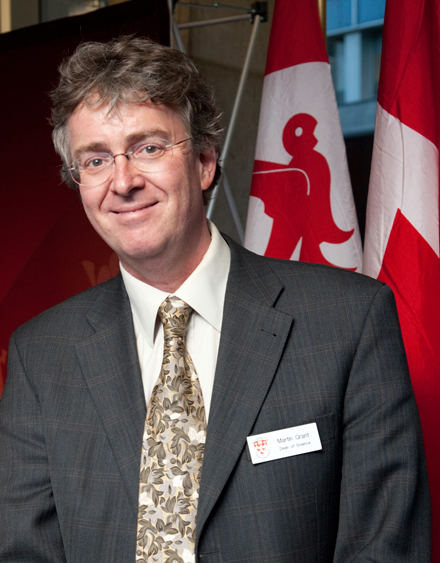The following is the Senate speech on the academic legacy of Heather Munroe-Blum delivered by Dean of Science, Martin Grant, on May 15, 2013.

Senators, I wish to reflect upon the academic legacy of Principal Heather Munroe-Blum as she presides over Senate for the last time. I appreciate deeply the Principal’s contributions to McGill, which have changed us for the better. How has the academic leadership of the Principal been expressed? It is both more subtle and more pervasive than one might think.
Of course the academic impact of our institution is expressed prosaically in our classrooms, our laboratories, our seminar rooms. We do not expect senior academic administrators or Senators to ring up staff and say, for example, “Vicky, I was just thinking you might want to minimize the Fourier ringing by isolating the pulsar’s rotation”, or, “Rod, I was just thinking about transactional law and Hegel, and I had a few ideas I would like to kick around when you’ve got a minute.” No academic administrator does this. Or at least, none does it twice. Administrators work behind the curtains, as does Senate, driven by our institution’s fundamental academic values and goals.
This afternoon, I would like to briefly talk about the Principal’s work behind the scenes: why she does it, why all of us do it, what her values and goals are, how they are congruent with McGill’s, and where we are giving thanks to the Principal. This is complementary to Dean Ellen Aikin’s speech last week at a private occasion commemorating the Principal’s legacy in the spotlight.
There are different theories about how and why people work behind these curtains, I will tell you what I have observed. In a conversation with the Principal, after I had dealt with a difficult issue, she asked me how I felt about my job. I said, to be honest, and I don’t understand it, but I don’t feel comfortable without some weight on my shoulders. She looked a little startled and said, “yeah, me too.” I have empirically determined that other academic administrators feel the same way. Indeed, at the other event last week I mentioned, I heard the Principal say she is most comfortable with some weight to carry.
Let me get to values and goals. In the spring of 2002 it was announced that Heather would be our next Principal – but in January of 2003. This interim provided an opportunity for long-distance scrutiny. For example, I read briefs the Principal had written while a VP at Toronto, to get a sense of our Principal-designate. Curiously, in these documents there were no lazy arguments of entitlement, or laissez-faire. Instead, there was the simple one-two punch of hard rational arguments, advanced by a person standing on her own two legs, supported by sound academic principles. And I thought, and think, that looks familiar, this is the sort of person who will fit in well and whom we need at McGill.
We are now all familiar with Heather’s qualities and methods. Identify strengths empirically. Identify aspirations, consonant with those strengths. Then, differentially flow resources to enhance our strengths and advance our aspirations. This is the simple path of those who cannot or will not advance the argument of entitlement. Such an approach advances McGill’s fundamental identity, the exceptionalism of a modern meritocracy. These arguments have served us well for a very long time, and they are the arguments we shall continue to make.
Indeed, our origin and early success as a modern university can be traced to the leadership of another singular Principal, William Dawson, a naturalist, paleontologist, and geologist who led McGill from 1855 to 1893. The turn of the century brought about the culmination of his effort: McGill became one the world’s great universities due to Dawson’s work.
There is a resonance over the years as we reflect upon our Principal’s academic legacy. A century after Dawson’s time, McGill retains our long-standing strengths, embodied for example by our exceptional students, but we have been enormously changed and strengthened by an unprecedented academic renewal of high quality faculty in targeted areas of strength and aspiration. We are now at a place we have not been at for over a century through many people’s work, but particularly through Heather’s leadership.
Heather has brought us here through her courageous commitment, her youth and charisma, her consistent and disciplined faith in rational arguments, her overarching belief in the necessity of excellence, of achievement being deeply recognized and rewarded, and finally and fundamentally, the necessity of ambition in the service of our institution. In sum, her leadership, her vision, her relentless drive for excellence has positioned McGill as a university in and of Montreal that makes a difference in Quebec, in Canada and in the world, on the basis of meritocracy and exceptionalism.
Now, notwithstanding current challenges, we have every reason to believe we are on track to enter a new golden age of our institution, parallel to that of a century ago. If we prepare for less, we will surely achieve that. If we prepare for success, and we are steadfast, we will achieve that instead, despite these difficult times. Yes, we have some distance yet to travel, and yes we have some weight to carry on our backs. But the legacy of Principal Heather Munroe-Blum is clear, and her values, goals and achievements serve to illuminate the path ahead. For we are renewed, we are strong, we will succeed.
Senators, let us recognize our Principal.
Thank you.
